Kyle Prevost, creator of 4 Steps to a Worry-Free Retirement, Canada’s DIY retirement planning course, shares financial headlines and offers context for Canadian investors.
U.S. Fed cuts rates for the first time in four years
The U.S. dollar remains the most important currency in the world, and the American economy is arguably the most important financial system as well. Consequently, when the U.S. Federal Reserve makes a big announcement, it creates an economic wave that ripples everywhere. That’s why Wednesday’s decision to cut the key overnight borrowing rate by 0.50% is a very big deal.
Many speculated the U.S. Fed would begin cutting rates this week, but it was generally thought it would go with a 0.25% drop to begin an interest rate-cut cycle. The 50 basis points cut lowers the federal funds rate range 4.75% to 5%.
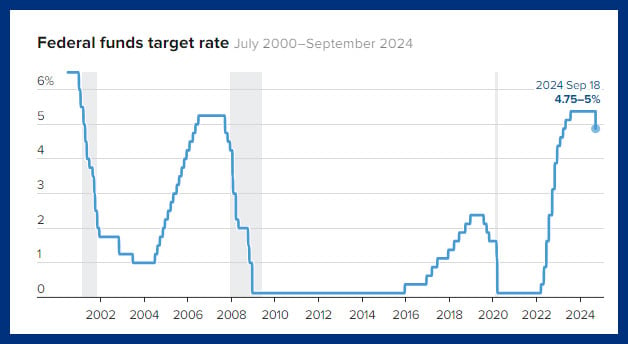 Source: CNBC
Source: CNBC
The U.S. Fed announced in a statement: “The Committee has gained greater confidence that inflation is moving sustainably toward 2%, and judges that the risks to achieving its employment and inflation goals are roughly in balance.”
Federal Reserve Chair Jerome Powell said, “We’re trying to achieve a situation where we restore price stability without the kind of painful increase in unemployment that has come sometimes with this inflation. That’s what we’re trying to do, and I think you could take today’s action as a sign of our strong commitment to achieve that goal.”
Immediately after the news of the U.S.’s first interest rate cuts in four years, major stock market indices responded with a brief jump on Wednesday. But they ended the day nearly flat. That seemed to be a bit of a delayed reaction from investors, as the Bulls returned Thursday with Nasdaq soaring 2.5% and the Dow leaping 1.3% to pass 42,000 for the first time ever.
Notably, former U.S. President Donald J. Trump continued to criticize the monetary decisions made by the U.S. Federal Reserve. This despite centuries of financial wisdom telling us that politicians getting involved in short-term monetary policy is a bad idea. (See: Turkey – Erdoğan, Tayyip.) At bitcoin bar PubKey on Wednesday, Trump said, “The economy would be very bad, or they’re playing politics.”
The larger-than-expected rate cut left some commentators questioning if this action would spook the markets. But, if the U.S. Fed manages to thread the needle and cut rates without a recession, it could be a good thing. The historical precedents are very positive for shareholders.
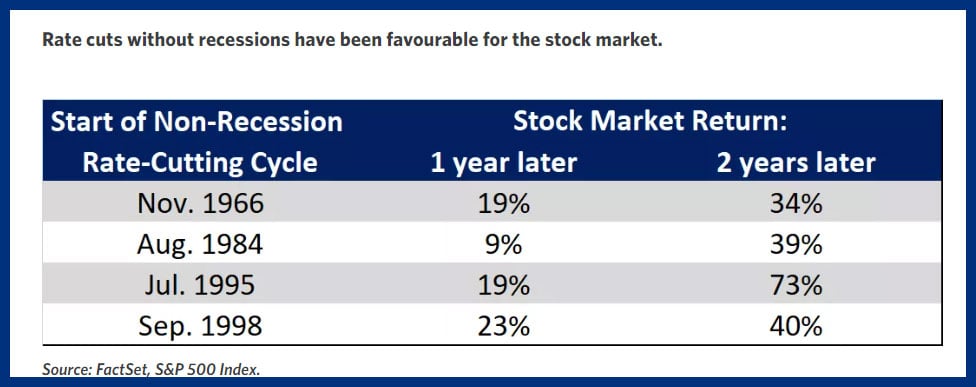 Source: EdwardJones.ca
Source: EdwardJones.ca
This large rate cut helps ease pressures on emerging markets that borrowed in U.S. dollars. And, it takes some of the pressure off other central banks around the world that didn’t want to see their currencies devalued too much relative to the mighty USD.
Featured accounts

Provide a 30-day notice before withdrawing your cash and earn 4.25% (or 4% when you provide 10-day notice).

Lock in your deposit and earn a guaranteed interest rate of 4.25%.

$0 commission on all online stock transactions. No minimum deposit needed.
MoneySense is an award-winning magazine, helping Canadians navigate money matters since 1999. Our editorial team of trained journalists works closely with leading personal finance experts in Canada. To help you find the best financial products, we compare the offerings from over 12 major institutions, including banks, credit unions and card issuers. Learn more about our advertising and trusted partners.
Canadian inflation back on target
The Bank of Canada (BoC) looks set to continue cutting rates, as Tuesday’s Statistics Canada report revealed that headline inflation is now at 2%; the exact rate the central bank targets as its Goldilocks not-too-hot, not-too-cold inflation. However, given the steady downward inflation trend, there is very little pressure to delay rate cuts over the next few months. The 2% inflation reading is the lowest it’s been since February 2021, and it’s also down from 2.5% in July this year.
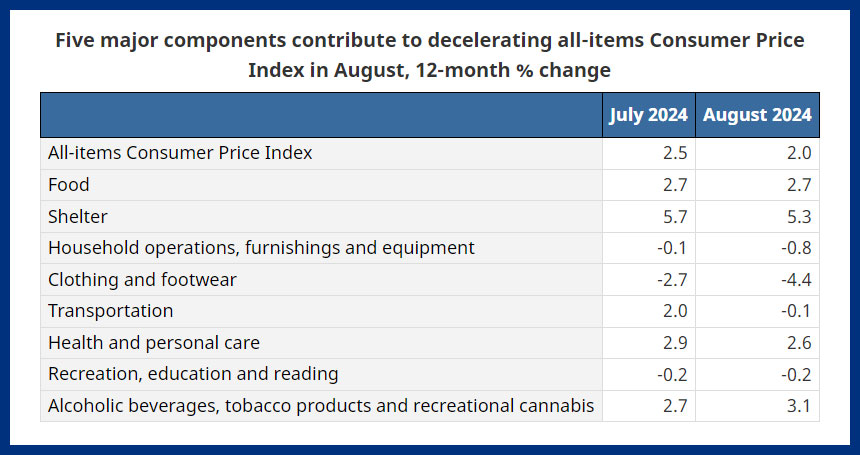 Source: Statistics Canada
Source: Statistics Canada
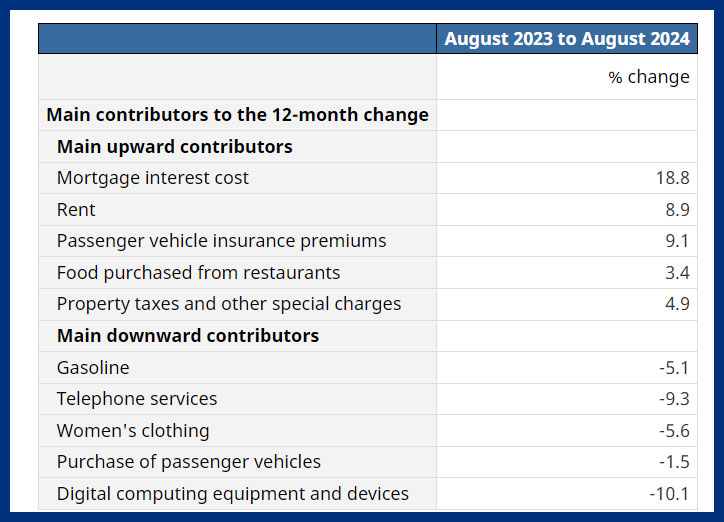 Source: Statistics Canada
Source: Statistics Canada
It’s pretty clear why housing costs continue to dominate the discussion in Canada. Clearly, homes are the main driver of the inflation conversation. With mortgage interest rates dropping because of the lowered key interest rate, and cuts in the coming months, too, Canadians are hoping it also relieves some pressure on the rental market.
Aside from shelter costs, the other parts of the economy may be part of a potential deflationary spiral. It’s also worth noting that when prices on items like gasoline, phone plans and clothing go down, these don’t get nearly as much commentary as when they rise. It thereby contributes to a misunderstanding of current economic conditions. Often these prices decrease or go stagnate, pulling inflation down as other prices go up.
Meanwhile we’ve started to see a definitive trend of investment dollars out of the tech sector and into more defensive sectors (with more sustainable dividend yields) as an overall slowdown seems more likely.
FedEx fails to deliver
It was a rough quarter for FedEx as it missed expectations on both earnings and revenue.
U.S. earnings highlights
All figures in U.S. currency in this section.
FedEx (FDX/NYSE): Earnings per share of $3.60 (versus $4.76 predicted). Revenue of $21.60 billion (versus $21.96 billion predicted). General Mills (GIS/NYSE): Earnings per share of $1.07 (versus $1.05 predicted). Revenue of $4.85 billion (versus $4.77 billion predicted).Given FedEx’s large miss, it’s not a surprise its shares were down 11% in after-hours trading on Thursday evening.
In addition to its low profits last quarter, FedEx almost lowered its full-year revenue forecast. The company struggled with how to normalize operations after the online shopping boom of the pandemic. FedEx executives announced they would be letting go of the United States Postal Service (USPS) air contract, as it could not turn a profit on that $1.75 billion in revenue. FedEx rival United Parcel Service (UPS) will likely take over that contract. FedEx also announced it was assessing whether to sell its freight division as part of streamlining efforts.
General Mills had a routine quarter, and its stock traded almost flat on Thursday.
In other news, Microsoft (MSFT/NASDAQ) was up about 3% this week as its board approved a $60-billion share buyback program, and it increased its dividend by 10%.
Should we be scared of quiet all time-highs?
Imagine stopping the average Canadian on the street and asking them if the economy was doing well? Or asking if they felt 2023 was a good year for the stock market? I bet they would say no. While there’s never a shortage of headlines when the stock market is falling, news when times are good are much harder to come by.
The last year was excellent for both Canadian and American stocks by all measures. New highs are consistently hit with very little volatility. You never read something like: “Stocks up 0.73% today—remaining at an all-time high.” Yet, just because it’s at an “all-time high” today, doesn’t mean it won’t go up again tomorrow.
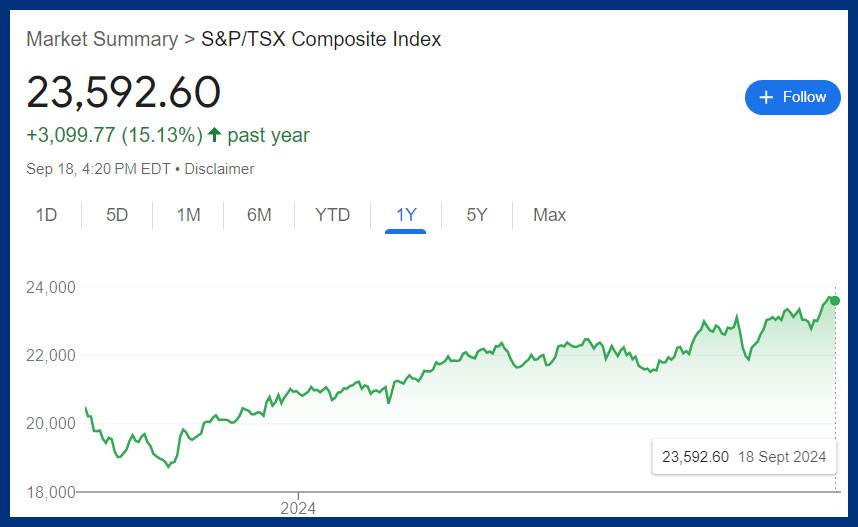 Source: Google Finance
Source: Google Finance
There’s the flip side of the good news-is-not-news phenomenon. I think you can call it the good-news-is-scary theory. The idea—which seems logical at a glance—is when the markets are at an all-time high, there’s nowhere to go but downward. If your understanding of the stock market is that you should, “buy low, sell high” then this all makes sense. However, it basically ignores the fact the stock market usually goes up, and does so for long periods of time. The S&P 500, for example, has hit new highs more than 1,250 times since 1950.
Let’s look at what happens if we invest only at the “worst” times, meaning when stocks are at all-time highs, we see that the results are pretty solid.
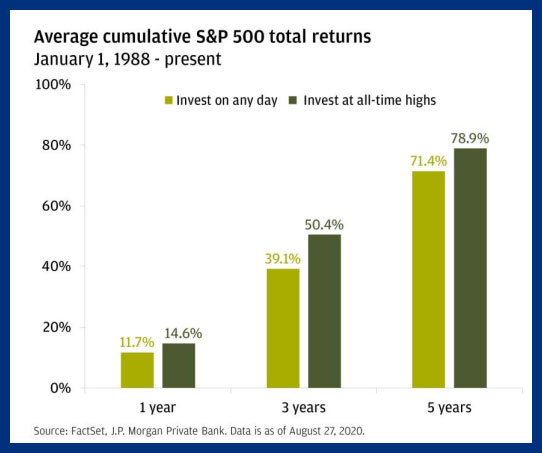 Source: JPMorgan.com
Source: JPMorgan.com
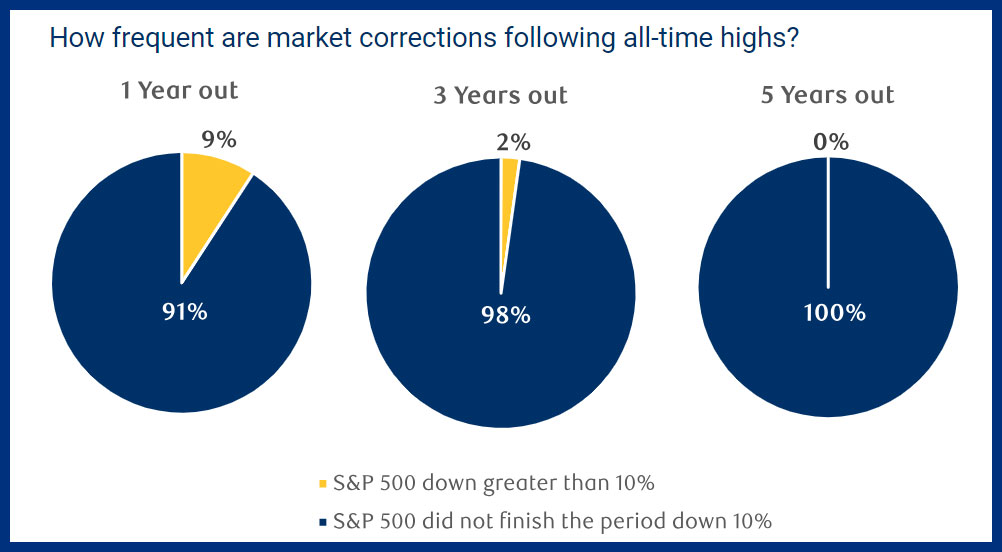 Source: RBC.com
Source: RBC.com
While similar Canadian data is difficult to come by, I believe we can see a similar story here to what we see in that JP Morgan chart. After all, despite this excellent year that we just had, Canadian stocks are not “expensive” by traditional measures.
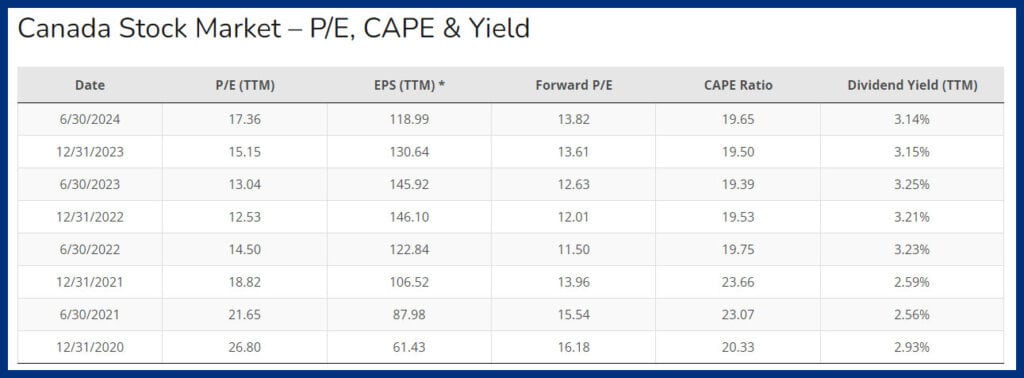 Source: SibilisResearch.com
Source: SibilisResearch.com
The TSX is still yielding around 3%, and our forward price-to-earnings (P/E) ratio is substantially lower than it was in 2020. Overall, the reasons to invest at all-time highs currently outweigh the reasons not to invest at all-time highs—and that’s almost always the case.
Check out MoneySense’s list of the best ETFs in Canada, as well as the Canadian stocks and ETFs I’m currently investing in at MillionDollarJourney.com.
Read more about investing:
Best ETFs in Canada Is VFV a good buy? What about other U.S. ETFs with even lower fees? Buying your first stocks in Canada How much is capital gains tax and other questions answeredThe post Making sense of the markets this week: September 22, 2024 appeared first on MoneySense.












 Bengali (Bangladesh) ·
Bengali (Bangladesh) ·  English (United States) ·
English (United States) ·